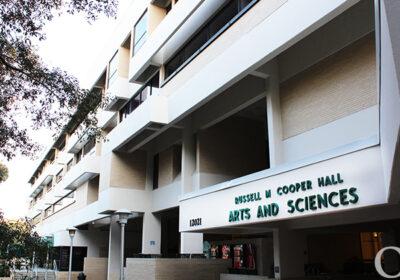Administrative plans for growth in diversity shared during town hall

USF President Rhea Law held a town hall Wednesday to share leadership plans for the fall semester, review the newly approved university operating budget and outline human resources’ staff support services.
The hourlong discussion — which was hosted both in person in the Marshall Student Center Ballroom and online through Microsoft Teams — began at 10 a.m. and had close to 360 attendees, many of whom included members of faculty and staff.
Joining Law were four other representatives from university leadership, each assigned their own topic to present to the audience.
Interim Provost Eric Eisenberg began the roundtable discussion by announcing diversity initiatives outlined in the university’s newest set of strategic plans.
Despite admitting one of USF’s most academically qualified freshman classes for the fall semester, Eisenberg said enrollment rates for first-time-in-college Black, Hispanic and Asian students have been concerning, further exacerbating the university’s struggle with representation in the student body.
“We continue to focus on enrolling a diverse incoming class of first-time college students. If you look at our headcount, we have grown the absolute number of Hispanic, Asian and Black students over the last five years. But if you look at the proportion of first-time college students, our diversity remains unchanged over that five-year period,” he said.
“Now, there is something that we are very concerned about … last year, we had a huge spike in incoming first time in college Black students, and this year it was down 56 students at 12%. This is unacceptable, because … as a public university, we want us to have a body that reflects the diversity of our communities, our state and nation.”
Remedying a lack of representation will require greater focus on promoting values of diversity and community outreach, according to Eisenberg. One of his initiatives is establishing an outreach program for students in predominantly minority high schools in Hillsborough and Pinellas counties to promote USF as an attractive post-graduate institution.
While specific details were not provided for the plan, he later said a major focus of his development program will also be to create an attractive and supportive environment for Hispanic and Black students.
As a partner on Eisenberg’s strategic team, Interim Vice President for Diversity, Equity and Inclusion Tricia Penniecock said building a diverse and inclusive community for learning and discovery is essential for quality education.
“Diversity is like salt,” she said. “It enhances flavor and we can use it in education because students deserve for it to be tasty.
“I’m seeing more and more of a blending where diversity is no longer an afterthought or something that we can use temporarily, but that everybody uses in every activity. It allows us to add flavor to enhance the richness of what we do.”
Faculty can take action to promote diversity by engaging with topics surrounding ethnicity, gender, race and sexual orientation, according to Penniecock. For students, she said meaningful interaction with peers on controversial topics stands as a pillar of higher education.
Insight on the university’s newly approved 2022-23 operating budget came from Senior Vice President of Financial Strategy and Administrative Services Richard Sobieray. Illustrating his objectives for the semester, he said his primary focus will be to promote transparency to the public on how money is segregated and allocated.
Wages for faculty and staff were raised to a minimum of $15 an hour with an additional provision for merit raises under Sobieray’s portion of the strategic plan. He said he aims for student resources, such as improving mental health services and physical infrastructure, to receive expanded budgetary attention from the Leadership Team’s Budget Committee.
Vice President and Chief Human Resources Officer Angie Sklenka added to Sobieray’s discussion of investments for staff. For faculty members looking to improve their career growth, she said Human Resources has created executive coaching and leadership toolkits to consult with for more information on employee resources.
In hopes of better personalizing hiring procedures, the leadership team is also looking to adopt a new “banquet” interview format, according to Sklenka. In contrast to solely conducting an interview, she said prospective applicants will have the opportunity to visit USF prior to their interview and learn more about what the application process will be like.
For Law, the strategic plans outlined in the session are representative of positive changes for not only the campus, but USF’s future as a competitive university. Whether it be student success initiatives or partnerships, she said she hopes students and faculty can be proud of their university when reflecting what it has been able to achieve.
“I look at these people that are here, or those that are online, and I ask you to reach out into your own areas of influence. People ask about USF and you know more about USF than anybody, so you want to be able to explain to them what we do here to make people successful,” she said.
“I think it starts here. It starts with each of you. It starts with the way we present ourselves … and there’s so many ways we can reach out and touch our communities. That’s the basis of our strategic plan and our partnerships, our ability to reach our community.”






